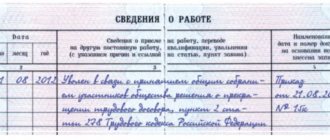Source: Journal “Human Resources Department of a State (Municipal) Institution”
Sometimes an employee has to be transferred to another job for some time. Such a need can be caused by a number of reasons - medical indications, production needs, etc. However, not everything is so simple with the transfer procedure. For example, some people confuse a transfer with a transfer and do not formalize it properly or underpay wages when transferring to a lower-paid position. You will learn in what cases temporary transfers are possible, how to distinguish them from transfers, in what amount to pay the temporarily transferred employee and how to document all this by reading the article.
Instead of a preface
In accordance with Art. 72.1 of the Labor Code of the Russian Federation, transfer means a permanent or temporary change in the labor function of an employee and (or) the structural unit in which the employee works, while continuing to work for the same employer, as well as transfer to work in another location together with the employer.
Please note that a change in a structural unit will be considered a transfer only if its name was fixed in the employment contract (for example, in the form of the phrase “The employee is hired as an accountant in the financial and economic department”).
Since today we are considering temporary transfers, it is worth noting that they can be carried out either with or without the employee’s consent.
Grounds for changing an employee’s job functions
A change of position or place of work is permitted under certain circumstances, namely:
- at the request of the citizen himself;
- at the initiative of the manager;
- when the company moves to another office or another location;
- if the employee has medical contraindications;
- when the company's workforce is reduced;
- when technological or organizational working conditions change;
- in connection with the retraining of an employee;
- due to unforeseen reasons (fire in a building, industrial accident, other man-made or natural accident).
Most often, the transfer is initiated by the manager. The main reasons for changing positions are a reduction in the number of company personnel due to financial problems, changes in production volumes, and improvement of the employee's qualifications.
If an employee fails the certification, the boss has the right to demote him in position.
An employee usually declares the need to be transferred to another job if he has medical indications. For this purpose, the application requesting a change of position is supplemented by a certificate from a medical institution.
Temporary transfer with the consent of the employee
To carry out a temporary transfer, an agreement must be concluded in writing.
The employer first offers the employee a vacant position or a position where an absent employee needs to be replaced. Then, if agreed, an additional agreement is concluded on a temporary transfer to another job, position or to another structural unit. And first of all, let's talk about the timing of such a transfer. A temporary transfer to another job with the same employer is possible for a period of up to one year, and in the case where such a transfer is carried out to replace a temporarily absent employee, whose place of work is retained in accordance with the law, until this employee returns to work.
We note that by virtue of Part 4 of Art. 72.1 of the Labor Code of the Russian Federation, it is prohibited to transfer or relocate an employee to a job that is contraindicated for him due to health reasons. That is, if there are no medical contraindications and the employee agrees, then he can be temporarily transferred to work even with harmful or dangerous working conditions.
When concluding a transfer agreement, fix in it the basis for the transfer, its duration, the employee’s new responsibilities, as well as other conditions that differ from those established by the employment contract.
Let's talk separately about the wording of the transfer deadline. If a temporary transfer is carried out to a vacant position, you can determine a specific end date for the transfer, and if to replace a temporarily absent employee, it is better to indicate the condition upon the occurrence of which the employee returns to his workplace, because the absent employee may return to work later (for example, when extending vacation or certificate of incapacity for work). For the latter case, the wording may be as follows: “This additional agreement is valid until the date of the leading specialist E. D. Gulkina’s return to work from maternity leave.”
Based on the agreement signed by the parties, a transfer order is issued in the unified form T-51] (T-5a). It is important to indicate in the “Type of transfer” line that the transfer is temporary. The employee must be familiarized with such an order against signature.
The next step in registering a temporary transfer will be to make an entry about it in section. III personal card “Hiring and transfers to another job” (form T-2 or T-2 GS (MS)).
But an entry about a temporary transfer is not made in the work book. This rule is established by Part 4 of Art. 66 of the Labor Code of the Russian Federation and clause 4 of the Rules for maintaining and storing work books [2], according to which entries only about permanent transfers are made in the work book.
note
If an employee is transferred to another job or position, he must be familiarized with the job description and other local regulations relevant to the performance of this work. In addition, you may need to conduct safety training or enter into a liability agreement.
Let us note that the employer should control the end of the temporary transfer, since by virtue of Part 1 of Art. 72.2 of the Labor Code of the Russian Federation , if at the end of the transfer period the employee’s previous job is not provided, and he did not demand its provision and continues to work, then the condition on the temporary nature of the transfer loses force and the transfer is considered permanent. In this regard, the question arises: is it necessary to somehow formalize the provision of the previous job? Labor legislation does not contain requirements for processing the return of an employee. In the meantime, we recommend doing this. Usually, for this purpose, an order (instruction) is issued to terminate the performance of duties in a temporary position and return to the performance of duties in the main position. He might look like this.
State Autonomous Institution of the Arkhangelsk Region
"Sports Training Center"
ORDER
August 20, 2014 No. 84
Arkhangelsk
Due to the expiration of the temporary transfer period by agreement of the parties
I ORDER:
1. Olga Viktorovna Pshenitsyna, who temporarily, by agreement of the parties dated 04/04/2014 No. 2, held the position of deputy head of the sports teams support department, to begin work stipulated by the employment contract dated 06/12/2010 No. 10‑06, as the chief specialist of the sports teams support department teams, since August 21, 2014
2. The accounting department will accrue O. V. Pshenitsyna’s wages in accordance with the staffing schedule for the position of chief specialist in the department for supporting sports teams.
Director Zlakov I. I. Zlakov
I have read the order. Pshenitsyna, 08/20/2014
It may happen that the main employee quits or the temporarily filled position is completely vacant, and the management of the organization, and even the temporary employee himself, is not against making the temporary transfer permanent. In this case, it is necessary to conclude another additional agreement, indicating in it that the temporary transfer made under the agreement from such and such a date is considered permanent. Based on the agreement signed by the parties, it is necessary to issue an order in any form, which also stipulates that the condition on the transfer period has become invalid.
Note that there is a nuance in this situation. When transforming a temporary transfer into a permanent one, it is necessary to make an entry in the work book. Moreover, the date of transfer will be considered the first day of the temporary transfer.
Example
By agreement of the parties, from February 3, 2014, the employee of the State Budgetary Institution was transferred to the position of foreman of the road maintenance section for six months. After this period, the parties signed an agreement that the transfer is considered permanent. How to make an entry in the work book?
| № records | date | Information about hiring, transfer to another permanent job, qualifications, dismissal (indicating reasons and reference to the article, clause of the law) | Name, date and number of the document on the basis of which the entry was made | ||
| number | month | year | |||
| 1 | 2 | 3 | 4 | ||
| … | … | … | … | … | … |
| State budgetary institution | |||||
| Vladimir region "Management | |||||
| highways" | |||||
| 8 | 09 | 12 | 2012 | Hired as a leader | Order dated 12/09/2012 |
| specialist expert. | № 22 | ||||
| 9 | 03 | 02 | 2014 | Transferred to the position of chief | Order dated 02/03/2014 |
| work acceptance department | № 16* | ||||
| for repairs and maintenance | Order dated July 28, 2014 | ||||
| highways. | № 47** | ||||
* Temporary transfer order.
** Order to invalidate the condition on the temporary nature of the transfer.
Please note that if an employee does not start work under an employment contract, that is, wants to continue working in accordance with the order for a temporary transfer, the employer has the right to apply disciplinary measures to him: a reprimand, a reprimand, dismissal on appropriate grounds, for example, for absenteeism - pp. “a” clause 6, part 1, art. 81 Labor Code of the Russian Federation .
How is transfer to another job carried out?
This process has certain nuances related to the specifics of the transfer (the timing of the change in the employee’s place of work, the reasons for issuing this order, etc.). To ensure proper documentation and proper translation, it is recommended to follow the instructions below:
- manifestation of initiative (the employee himself, his boss or the trade union can express an idea, and it is not necessary to formalize the request for a transfer in writing, since at the initial stage it is possible to communicate this orally);
- familiarizing the employee with local regulations and job instructions related to the new job (the person must put the appropriate signatures in a special journal and documents to confirm the fact of familiarization);
- execution of an additional agreement attached to the main contract (if we are talking about internal translation, the contract cannot be terminated, only changes are made to it);
- drawing up an order (order) on the basis of which a change in official activity is carried out;
- familiarization of the citizen with the text of the document against signature;
- fixation in
employee and his
relevant records.
An integral part of this procedure is the execution of an additional agreement and the corresponding order, without which the transfer will be considered illegal.
In addition, the personnel officer or other person authorized to manage personal files of employees must make the necessary entries in the work book and personal card.
We recommend material: Entering a disciplinary sanction into the work record book.
Temporary transfer without employee consent
As we have already understood, as a general rule, a temporary transfer, as well as a transfer on a permanent basis, is made by agreement of the parties to the labor relationship. However, the Labor Code makes an exception for some cases. So, an employee can be transferred without his consent to work not stipulated by an employment contract with the same employer in order to prevent or eliminate the consequences:
- natural or man-made disasters;
- industrial accident or accident at work;
- fire, flood, famine, earthquake, epidemic or epizootic;
- any exceptional cases threatening the life or normal living conditions of the entire population or part of it.
The period for transferring an employee without his consent cannot exceed one month.
Transfer of an employee without his consent to work not stipulated by the employment contract with the same employer is also permitted in the following cases:
- downtime (temporary suspension of work for reasons of economic, technological, technical or organizational nature);
- the need to prevent destruction or damage to property;
- replacing a temporarily absent employee.
However, it is worth considering that for a transfer in these cases, both the simple and the need to prevent destruction or damage to property or to replace a temporarily absent employee must be caused by the emergency circumstances specified above.
The Plenum of the Armed Forces of the Russian Federation in Resolution No. 2 [3] noted that if, when transferring to another job in the event of downtime, the need to prevent destruction or damage to property, or replacing a temporarily absent employee, an employee will have to perform work of a lower qualification, then such a transfer by virtue of Part. 3 tbsp. 72.2 of the Labor Code of the Russian Federation is possible only with the written consent of the employee.
The Labor Code does not limit the number of such transfers of an employee during a calendar year, since in these cases unforeseen and urgent work is performed. But if, due to emergency circumstances, it becomes necessary to transfer an employee for a period of more than one month, the transfer is still possible only with the consent of the employee.
We emphasize: if the employer cannot prove the existence of circumstances with which the law connects the possibility of a transfer without the employee’s consent, such a transfer will be declared illegal ( clause 17 of Resolution No. 2 ). Thus, T. has worked as a cardiovascular surgeon at the Pskov Regional Hospital since 1999. By order of the chief physician, he was temporarily transferred without his consent to the clinic of the regional hospital to the position of cardiovascular surgeon, citing the need to fill a vacant position and in order to prevent a threat to the life and health of the population. Believing the employer’s decision to be illegal, T. refused to perform his duties at the clinic, for which he was subjected to disciplinary action in the form of a reprimand. The court declared illegal both the order to impose a disciplinary sanction and the order of temporary transfer. The State Budgetary Institution of Health did not provide evidence of the existence of extraordinary circumstances that necessitated the temporary transfer of the employee without his consent to a job not stipulated by the employment contract. The transfer was carried out under the pretext of production necessity in the absence of exceptional cases indicating the real need for such a transfer, and therefore the specified transfer is illegal ( Appeal ruling of the Pskov Regional Court dated October 2, 2012 in case No. 33-1580 ).
note
Refusal to perform work during a transfer in case of emergency, carried out in compliance with the law, is recognized as a violation of labor discipline, and absence from work is considered absenteeism ( clause 19 of Resolution No. 2 ). It should be taken into account that, by virtue of para. 5 hours 1 tbsp. 219 , part 7 art. 220 of the Labor Code of the Russian Federation, an employee cannot be subject to disciplinary action for refusing to perform work in the event of a danger to his life and health due to violation of labor protection requirements, except for cases provided for by federal laws, until such danger is eliminated or from performing heavy work and work with harmful and (or) dangerous working conditions not provided for in the employment contract. Since the Labor Code of the Russian Federation does not contain rules prohibiting an employee from exercising this right even when the performance of such work is caused by a transfer on the grounds specified in Art. 72.2 of the Labor Code of the Russian Federation , an employee’s refusal to temporarily transfer to another job for the reasons stated above is justified.
A temporary transfer without the employee’s consent must also be formalized. To do this, a transfer order is issued indicating the reasons (catastrophe, industrial accident, etc.). And of course, it is better to support such an order with relevant documents, otherwise the employee may refuse the transfer.
Translation or relocation?
Sometimes an employer confuses a temporary transfer with a relocation and, instead of drawing up an agreement and order for the transfer, issues a relocation order. Let us remind you that by virtue of Part 3 of Art. 72.1 of the Labor Code of the Russian Federation, moving from the same employer to another workplace, to another structural unit located in the same area, assignment of work on another mechanism or unit, if this does not entail a change in the terms of the employment contract determined by the parties, does not require the consent of the employee.
Before moving, carefully check the terms of the employment contract - whether it indicates the workplace, structural unit, and whether the employee’s job function will change. Otherwise, labor disputes cannot be avoided. Thus, G., working at the State Unitary Enterprise as a senior accountant, was transferred to the position of accountant. The PMU believed that these positions had similar job functions. Considering the dispute about declaring the transfer order illegal, the court noted: from the employer’s order it follows that in fact there was not a transfer, but a transfer of G. to another position, which entailed a change in the employee’s labor function. These actions were carried out without the consent of G., therefore, the order to move is illegal ( Appeal ruling of the Yaroslavl Regional Court dated April 25, 2013 in case No. 33-2536/2013 ).
Remuneration for temporary transfer
When transfers are made without the consent of the employee (in the cases mentioned in Parts 2 , 3 of Article 72.2 of the Labor Code of the Russian Federation ), wages are paid according to the work performed, but not lower than the average earnings for the previous job. That is, if the employee’s wages for the work performed are lower than his previous average earnings, then he is paid the previous average earnings, determined in the prescribed manner.
Well, if the salary for the new job exceeds the average salary of the employee, then he is given an additional payment up to the salary for the new job. Thus, the demands for recovery of lost wages were satisfied by the court: during the period of temporary transfer to another position, the plaintiff performed the duties of an employee of a higher position, therefore, the difference in salary is subject to recovery in his favor ( Determination of the Perm Regional Court dated September 25, 2013 in case No. 33‑8092 ).
When a temporary transfer is carried out by agreement of the parties, wages are also determined by agreement of the parties, however, usually when transferring the employee, the salary of the new position is set. If he is transferred to a less qualified job, the parties can agree to maintain the previous salary or to assign an additional payment up to the previous salary.
Translation concept
The transfer of a person to another job means a change in his official duties and functions performed by him. It is important to take into account that the employee does not resign from the company, continuing to work for it in another position or another structural unit.
A change of workplace is possible both on the initiative of the employee himself and by decision of his management (it is important to obtain the written consent of the person).
In some cases, provided for in Article 72.2 of the Labor Code of the Russian Federation, there is no need to wait for the employee’s permission.
Temporary transfer for medical reasons
As we found out, a temporary transfer is carried out with or without the employee’s consent. However, according to Art. 73 of the Labor Code of the Russian Federation, the employer is obliged to transfer an employee to another job (position) if he needs it in accordance with a medical report.
Moreover, other work should not be contraindicated for the employee due to health reasons. For your information
A medical report is issued in the manner established by Order of the Ministry of Health and Social Development of the Russian Federation dated May 2, 2012 No. 441 “On approval of the Procedure for issuing certificates and medical reports by medical organizations . A certificate of temporary incapacity for work is not considered a medical report.
When receiving a medical report from an employee, first of all you need to pay attention to the transfer period indicated in the certificate, since the employer’s further actions depend on this.
If an employee is indicated for a temporary transfer to another job for a period of up to four months, the employer must offer him another job that is suitable for health reasons. In the absence of such or the employee’s refusal, the employer is obliged to suspend him from work while maintaining his place of work (position) for the entire period specified in the medical report. To do this, the employer issues an order in any form. The order should indicate the period for which the employee is suspended; if the period is still not specified, upon admission to work, an order should be issued on the employee’s admission.
If, in accordance with a medical report, an employee needs a temporary transfer to another job for a period of more than four months or a permanent transfer, then if he refuses the transfer or the employer does not have the corresponding work, the employment contract is terminated under clause 8 of Part 1 of Art. 77 of the Labor Code of the Russian Federation - the employee’s refusal to transfer to another job, which is necessary for him in accordance with a medical certificate issued in the manner established by federal laws and other regulatory legal acts of the Russian Federation, or the employer does not have the corresponding job. Upon dismissal on this basis, the employee is paid severance pay in the amount of two weeks' average earnings ( Part 3 of Article 178 of the Labor Code of the Russian Federation ).
For your information
According to Art. 254 of the Labor Code of the Russian Federation, pregnant women, in accordance with a medical report and at their request, are transferred to another job that excludes the impact of adverse production factors, while maintaining the average earnings for their previous job. Before being given another job, a pregnant woman is subject to release from work with the preservation of average earnings for all working days missed as a result at the expense of the employer. A similar guarantee is provided for women with children under the age of one and a half years.








